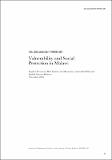Vulnerability and social protection in Malawi

Download
Date
2006Author
Devereux, Stephen
Baulch, Bob
Macauslan, Ian
Phiri, Alexander
Sabates-Wheeler, Rachel
Metadata
Show full item recordImpact
Abstract
Vulnerability appears to be rising for many Malawians, whose exposure to livelihood shocks
is increasing while their ability to cope is decreasing. The first part of this report draws on
recently published studies and analysis of the 2004/05 Integrated Household Survey dataset
to explore the nature of vulnerability in Malawi. Most livelihoods in Malawi depend on
agriculture, but agricultural vulnerability is extremely high due to erratic rainfall, inequality in
landholdings, constrained access to inputs, limited diversification and weak markets. Noneconomic
factors that compound economic risks include demographic and health risks,
gendered vulnerabilities, social change and governance failures.
Economic vulnerability, defined as the risk of future monetary poverty, is high because of
the heavy concentration of Malawians clustered close to the poverty line, and because of
the frequency and severity of covariant shocks such as droughts, floods and food price
fluctuations, as well as idiosyncratic shocks such as accidents, illness and death of family
members. The economic, demographic and social impacts of HIV/AIDS are especially
devastating. Monetary and subjective indicators of vulnerability are related to demographic
characteristics (female- and older-headed households, orphans), lack of assets, geographic
location (with a north-south gradient of rising vulnerability) and multiple shocks. Policy
priorities derived from this analysis include: stabilise food prices, enhance access to
agricultural inputs, and identify labour-saving technologies for labour-constrained
households. More generally, social protection and livelihood promotion measures, together
with an enabling environment, are central to addressing vulnerability in Malawi.
The second part of this report reviews a range of ongoing and discontinued social
protection mechanisms in Malawi. Free inputs distribution (‘Starter Packs’) followed the
abolition of fertiliser subsidies in the 1990s, and had positive impacts on food production
and prices. Public works programmes (food-, cash- or inputs-for-work), social funds (the
Malawi Social Action Fund) and food transfers (food aid, school feeding) also have long
histories in Malawi, but have demonstrated limited impacts. Finally, unconditional cash
transfers are increasingly popular, which this review endorses with the qualification that
ongoing pilot projects need to be institutionalised within a comprehensive, government
owned, national social protection strategy.
Keywords: Malawi, poverty, social protection, vulnerability.
Citation
Devereux, S., B. Baulch, I. Macauslan, A. Phiri and R. Sabates-Wheeler (2006) Vulnerability and social protection in Malawi. Discussion paper series, 387. Brighton: IDS.Is part of series
IDS discussion papers;387Library catalogue entry
http://bldscat.ids.ac.uk/cgi-bin/koha/opac-detail.pl?biblionumber=166699Collections
- IDS Research [1671]
